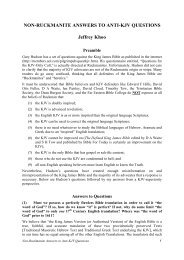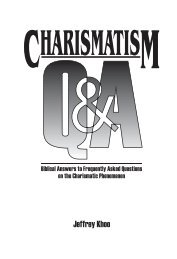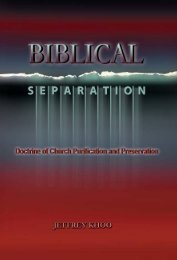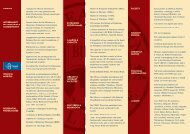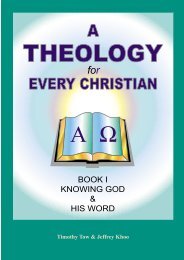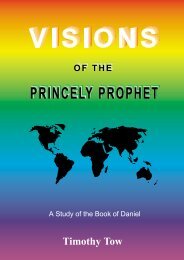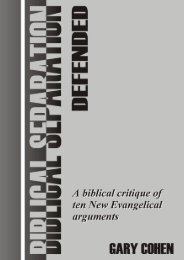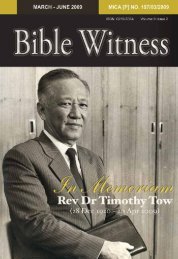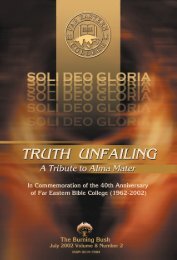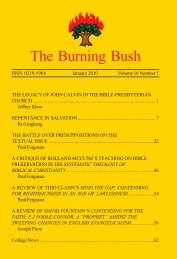50 Years Building His Kingdom - Far Eastern Bible College
50 Years Building His Kingdom - Far Eastern Bible College
50 Years Building His Kingdom - Far Eastern Bible College
You also want an ePaper? Increase the reach of your titles
YUMPU automatically turns print PDFs into web optimized ePapers that Google loves.
Life<br />
<strong>Bible</strong>-Presbyterian<br />
Church<br />
e. The position we take is that there is only One New Covenant and it was meant<br />
for the nation of Israel. But because of Israel’s rejection of their Messiah, the<br />
Church has come to benefit from the New Covenant, and only from its spiritual<br />
blessings. The physical blessings are not for the Church, but for Israel alone. The<br />
<strong>Bible</strong> foretells a time however when Israel will also benefit from the New Covenant,<br />
at the time when Christ returns and saves them. Then they will benefit both<br />
from the spiritual blessings as well as the physical blessings of the new covenant.<br />
Thus we believe that God has not given up on Israel. He still has some plans for<br />
them, that are different from <strong>His</strong> plans for us.<br />
f. We believe that this view is the one that is most biblically based of all. In Romans<br />
11:17-27, the apostle Paul used the analogy of an olive tree to illustrate this. Let<br />
me summarise what he wrote: The Covenant is represented by an olive tree. The<br />
Israelites are the natural branches of this olive tree. But because of their unbelief<br />
they were broken off from the tree. We, who are branches from a wild olive tree,<br />
were then grafted into the olive tree. And when the Israelites turn to Christ, they<br />
will be grafted back into their own tree again. And it is certain that this is going to<br />
happen one day.<br />
17. “We do reject the so-called “Biblical/Christian Counselling” of today (as taught by<br />
Gary Collins, Larry Crabb, Frank Minirth, et al) that is influenced by Freudian or<br />
humanistic methods which essentially question the sufficiency of Scriptures, and the<br />
power of the Gospel.”<br />
a. This brand of Christian counselling is not derived from the <strong>Bible</strong> but from psychology<br />
and from Sigmund Freud who taught and advanced the idea that people’s<br />
conscious thoughts and actions are driven by a powerful reservoir of repressed<br />
memories no longer directly accessible to the conscious mind. Freud invented<br />
psychoanalysis to uncover these hidden regions of the psyche through free association<br />
and dream analysis.<br />
b. Such psychological notions filter down into the church through writers such as<br />
Larry Crabb, Frank Minirth, Paul Meier, Gary Collins, James Dobson, Charles<br />
Solomon and many more psychologically trained individuals. People then read,<br />
interpret and teach what they suppose is biblical, without recognising that their<br />
presuppositions are from psychology rather than from Scripture.<br />
c. It promotes the idea that professional counsellors are better able than pastors,<br />
elders and other lay people, and that the <strong>Bible</strong> is not enough, to counsel Christians<br />
who have deep personal and emotional problems. It also encourages people to put<br />
the blame for their problems on their circumstances or on others, instead of bearing<br />
it themselves.<br />
Page 74




